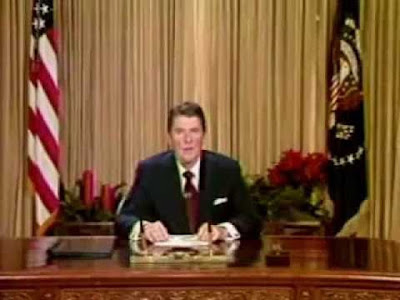 |
| Good man |
Yes, it was Ronald Reagan in 1981:
G.K. Chesterton once said that the world would never starve for wonders, but only for the want of wonder.The actual line, which Reagan or his speechwriters slightly changed, is from Chesterton's Tremendous Trifles (1909):
The world will never starve for want of wonders; but only for want of wonder.
Reagan continued a few sentences later:
Yes, we've questioned why He who could perform miracles, chose to come among us as a helpless babe. But maybe that was His first miracle, His first great lesson, that we should learn to care for one another.Intentionally or not, this echoes another theme from Chesterton, one that he most memorably articulated in his classic The Everlasting Man (1925). Chesterton writes of the Nativity, with the infant Jesus perhaps gesturing towards one of the animals:
. . . the hands that had made the sun and stars were too small to reach the huge heads of the cattle. Upon this paradox, we might almost say upon this jest, all the literature of our faith is founded . . . [T]his is exactly why there really is a difference between being brought up as a Christian and being brought up as a Jew or a Moslem or an atheist. . . . for [the Christian] there will always be some savor of religion about the mere picture of a mother and a baby; some hint of mercy and softening about the mere mention of the dreadful name of God. [But] it is no more inevitable to connect God with an infant than to connect gravitation with a kitten. It has been created in our minds by Christmas because we are Christians; because we are psychological Christians even when we are not theological ones. In other words, this combination of ideas has emphatically, in the much disputed phrase, altered human nature.
For Chesterton, the point wasn't that this illustrated the virtue of caring for each other per se, since all religions do that, at least in one form or another, but that an all-powerful God would not only suffer and die for us as a man but would also be born for us - literally and physically born as all men are born.
This is one of the things that makes Christianity unique, though it is at the same time difficult for many Christians to see. Christmas has made the idea seem so normal.
Muslims, for example, view the idea as a blasphemy - a grotesque insult to God's omnipotence and divinity - and I suspect that many religious Jews may feel similarly, though perhaps without the same degree of vehemence.
But I, as if suffering from a case of bad Chestertonitis, digress.
I think Reagan's speech was very good. You can grinch about the, as it were, ecumenism of it. But it was the address of an American president not of, say, a Roman pope. Like it or not, Reagan wasn't elected to defend Christian theology. But in this case I think a basic Christian spirit shines through. And he did begin by quoting Chesterton . . .
Indeed, we might contrast the obvious joy and goodwill of the speech and the man with the joyless hectoring of our current Pope, for whom Christmas is merely an opportunity to get in another Marxist nag at "materialism" or whatever.
Or we might contrast it with the recent Christmas address of the Obamas - two grinning ghouls making bad jokes and bragging about their political "accomplishments."
Reagan was often criticized for being too "feel good." I admit I used to sort of agree with that. All Reagan said, three years later was "it's morning in America" and, voila, landslide! or so it may have seemed.
But as my daughter might say, oh man. After three years of Bergoglio and eight years of Barack, I could use a little morning.
When a new president told us it was okay to feel good about our Christian faith and to feel good about America . . .

















